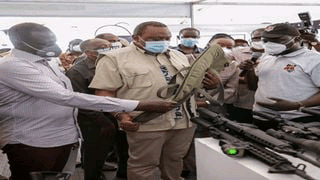Kenya is on the verge of achieving a significant milestone in arms control, aligning with its commitments to regional and international treaties. The country has made substantial progress in marking official firearms and ammunition, a critical step in combating the illegal arms trade.
The National Police Service has successfully marked 98% of its firearms stock, while the Kenya Defence Forces has marked 70%. This achievement was highlighted by Security Principal Administrative Secretary Wilson Njega, who emphasized the importance of this initiative in preventing the diversion of weapons to criminal elements and ensuring that legitimate weapons transfers are not disrupted.
The marking of firearms is not only a measure to curb illegal trade but also a means to enhance the traceability of weapons. This is crucial in dismantling criminal networks and reducing gun violence, a commitment that Kenya has made through various international agreements, including the Nairobi Protocol and the United Nations Programme of Action on Small Arms.
The Regional Centre on Small Arms (RECSA) has prescribed this marking exercise to its member states as part of a broader effort to stem the illicit proliferation of small arms and light weapons, thereby promoting peace and security in East and Central Africa.
Kenya’s remaining unmarked firearms are attributed to new stocks and areas where the marking exercise has not yet been conducted, such as Wajir and Mandera. Despite these challenges, the progress made thus far is commendable.
Ivor Richard Fung, deputy chief of the Conventional Arms Branch at the U.N. Office for Disarmament Affairs, praised RECSA member states for their transition from manual to electronic recordkeeping. The deployment of RECSA’s Software Tracing System for electronic records is a testament to the organization’s efforts in this domain.
The journey towards complete arms control is ongoing, and while significant strides have been made, there is still work to be done. Kenya’s dedication to this cause positions it as a leader among nations striving to ensure a safer world through stringent arms management.
Three years ago, President Uhuru Kenyatta opened the Small Arms Factory in Ruiru, Kiambu County to cater for the country’s small arms requirements. The new factory was developed at a cost of Kshs 4 billion and has an annual single-shift manufacturing capacity of 12,000 assault rifles with 60% of components being locally manufactured.
Through the local production of weaponry, Kenya seeks to enhance self-reliance, domestic innovation, and strengthening of local manufacturing capabilities, while offering decent jobs for her youth.






